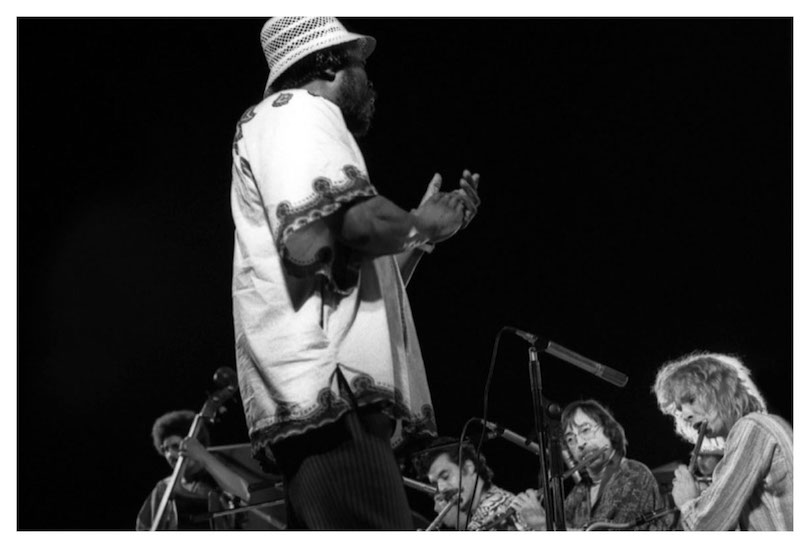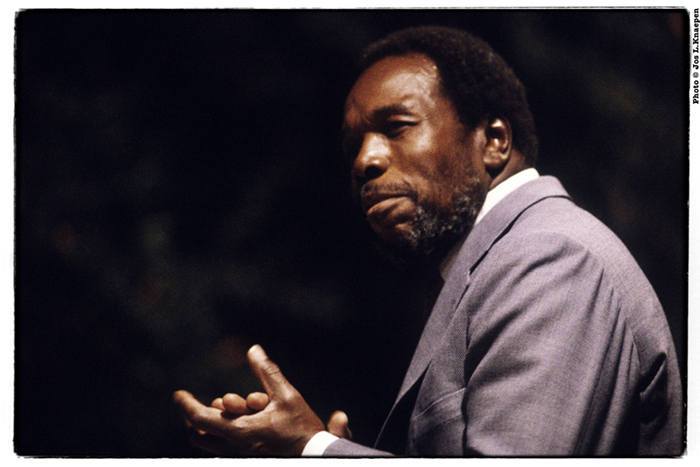Thaddeus Joseph Jones was born on March 28, 1923 in Pontiac, Michigan. Jones’s father, originally from Vicksburg, Mississippi, was a lumber inspector for General Motors and a deacon in the Baptist church. His mother was a housewife, who encouraged her five children’s interest in music.
Music was always valued in the Jones home and several of his brothers and sisters became professional musicians. In addition to his two talented brothers, pianist Hank Jones and drummer Elvin Jones, he had two sisters who studied piano and violin. Jones was inspired to play the trumpet after hearing Louis Armstrong play in nearby Detroit.
Jones was lucky enough to receive his first trumpet from an uncle, William, who himself was a musician. In school, Jones learned the rudiments of the instrument, but by age thirteen he began to teach himself with the aid of instruction books.
By the time Thad was sixteen years old, he was performing with his brother Hank in an ensemble called the “Arcadia Club Band,” which performed on the weekends as well as at school-based functions. In 1941, Thad left the group to perform on a tour of southern states with the Connie Connell Band.
In 1943, Jones was drafted into the army and was stationed at Camp Walters in Texas. Although he was appointed to the cargo division, he later joined a military band and played overseas. Upon his discharge from the military in 1946, he joined the Charles Young band in Oklahoma City. Not long afterwards, the band’s leader died unexpectedly at the age of twenty-six, and Jones took over leadership of the group until his father’s worsening health prompted his return to Michigan.
From 1950 until 1953, Jones performed with his brother Elvin in the Billy Mitchell Quintet. During this time he also toured with the “chitlin circuit” variety show Larry Steele’s Smart Affairs. Looking for more adequate work, Jones toured with saxophonist Candy Johnson and later worked with Jimmy Taylor. In 1952, Jones joined the house band of the Blue Bird Inn in Detroit. The group featured his brother Elvin, bassist James “Beans” Richardson, and pianist Barry Harris.
During his two-year stint with the Blue Bird Inn band, Jones received the opportunity to perform with Detroit luminaries who included guitarist Kenny Burrell and pianist Tommy Flanagan. It was also at the Blue Bird that Jones found an opportunity to develop his talents as an arranger and composer.

In May of 1954, Jones stepped into the national spotlight when he joined Count Basie’s newly reorganized band, now known as the “New Testament” Basie band, replacing Joe Wilder in the trumpet section. After recording sessions on Norman Granz’s Clef label with Basie, Jones performed on the bandleader’s 1955 sessions for Verve, which included the title track to the album
During the late summer of 1954, Jones went into the studio to complete the sessions that became his first solo album, The Fabulous Thad Jones. Released on Debut, the record label owned by bassist Charles Mingus and drummer Max Roach, the album was critically acclaimed and featured such songs as “Get Out Of Town” and “More Of The Same.”
On “Bitty Ditty,” Jones expertly constructs an arrangement that blends a big band atmosphere while keeping the texture of bebop instrumentation intact. Jones’s solo from elegantly displays his rich tone while serving the overall ensemble.
In 1956, Down Beat magazine awarded Jones their “New Star Award.” In 1957, he appeared with the Basie Band at a London performance for Queen Elizabeth, an occasion Jones honored in his composition “H.R.H. (Her Royal Highness).”
Other highlights from Jones’s tenure with Basie’s “New Testament” band include Neal Hefti’s “Li’l Darlin'” from the 1957 Blue Note album “The Complete Atomic Basie,” “Half Moon Street” from the 1958 Roulette album Chairman of the Board, which includes four tracks composed by Jones, and the paint-peeling “Counter Block,” recorded live at a late-night gig for the Disc Jockeys of America convention in Miami on May 31, 1959.
Also 1959, Jones recorded as a leader on the album Motor City Scene, which featured Kenny Burrell, Tommy Flanagan, and bassist Paul Chambers. In June of that year, he recorded a session with pianist Thelonious Monk which included Monk’s composition “Jackie-ing.” Trumpeter Tom Harrell once memorably described Jones’s much-admired solo on this track as “like Louis Armstrong on acid.”
In 1961, along with his Basie band members’ saxophonists Frank Foster and Frank Weiss provided the horn accompaniment for his brother Elvin’s first album, Elvin!

In February of 1963, while in Japan, Jones worked on director Koji Shima’s film Asphalt Girl with pianist Roland Hanna. In the same month, Jones left the Count Basie Band.
After leaving Basie, Jones performed with pianist George Russell and accompanied him on a tour of Paris. Upon his return to New York, Jones performed with baritone saxophonist Gerry Mulligan, in whose band he first met drummer Mel Lewis. In December of 1963, Jones played cornet with Thelonious Monk’s ten-piece big band at New York’s Philharmonic Hall at Lincoln Center. One more highlight of Jones’s freelance work is his 1968 rendition of “Speak Like A Child,” from pianist Herbie Hancock’s album of the same name.
In 1965, Jones and Lewis joined forces to create the “Thad Jones-Mel Lewis Orchestra,” an eighteen-piece ensemble which ultimately modernized the sound of big bands. Initially started as a rehearsal band, the group held onto a Monday-night gig at the Village Vanguard for thirteen years.
The orchestra made its debut on February 7, 1966 at New York’s Village Vanguard, starting a big-band tradition at the club on Monday nights which continues today. This debut is documented on the CD Opening Night, which is a perfect indicator of the group’s work to come. On “Big Dipper,” the arrangement exhibits a formal big band presentation, but adds modern motifs into the horn lines to add more power. The ornamental performance of Jones’s brother Hank on piano adds a lively emotion throughout the song.
In 1970, the orchestra released the album Consummation. The album became a modern big-band classic and featured many of Jones’s best-known compositions, which include “Dedication” and “A Child Is Born.” On “Tiptoe,” Jones presents a complex arrangement which makes full of every section of the orchestra. The staccato rhythm of the woodwinds and the playfulness of the piano add a powerful call and response. Lewis’s drum solo is simple, but proves a strong counterpoint to the back round horn lines. The big band continued to perform every Monday night at the Vanguard, as can be heard on the track “Little Pixie” from November of 1970.
During the 1970s, the Jones-Lewis big band made several tours overseas, including a U.S. State Department-sponsored tour of the Soviet Union. In 1979, the orchestra won the Best Jazz Performance Instrumental, Big Band Grammy Award for their album Live In Munich.
In 1978, while touring Yugoslavia, an unknown assailant caused an injury to Jones’s lip. As a result, Jones briefly switched to the valve trombone. The same year, Jones decided to leave the orchestra and move to Denmark, a move that shocked many of his colleagues. While in Copenhagen, Jones led the Danish Radio Orchestra and formed a new big band, which released the album Eclipse in 1980.
Jones’ teaching experience included positions at William Paterson University, then William Patterson College, in New Jersey and the Royal Danish Conservatory in Copenhagen.
In 1985, a year following Count Basie’s death, Jones rejoined his former leader’s big band as its leader. But as a result of his failing health, Jones resigned from the band in February of 1986 and returned to his home in Copenhagen.
Jones passed away on August 21, 1986. Though his cause of death was not made public, there have been reports that he passed away from cancer. Jones is survived by his wife Lis and his sons Thad and Bruce and his daughter Thadia. Jones is buried in the Vestre Kirkegard Cemetery in Copenhagen.